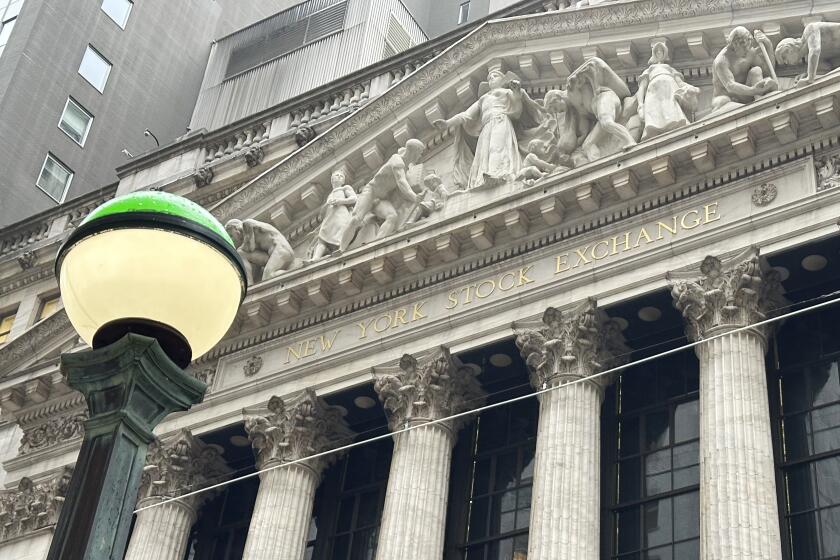Oil Moves Ease Supply Pressures
Wholesale oil and gasoline prices took their sharpest post-hurricane drop as the stricken energy industry inched toward recovery Friday and foreign nations said they would supply 60 million barrels of petroleum products to aid the U.S. market.
But the storm’s effect continued to ripple through the U.S. economy. Motorists still faced record-high pump prices, some major airlines were pushed closer to bankruptcy, and farming, retail and other industries braced for a financial blow.
“The gas prices are killing me,” complained Eagle Rock resident Marty Gaytan, 44, outside a Big Lots discount store in Highland Park.
The end result could be an economic downturn, said Bernard Baumohl of Economic Outlook Group. “We will be skirting a recession because there are still a lot of unknowns,” including the extent of the damage to the Gulf Coast oil industry.
The unprecedented gasoline prices have been accompanied by shortages in some Midwestern and Southern states that rely on fuel from the storm-ravaged gulf, where several refineries remained shut down.
In Michigan, for instance, the average price of self-serve regular surged 26.8 cents overnight to $3.132 a gallon Friday, according to AAA. The average topped $3 a gallon in Illinois and Indiana.
The average in California rose 5.8 cents Friday to $2.951, and it stood at $3.008 in San Francisco and $2.906 in Orange County, the auto club said. California Atty. Gen. Bill Lockyer launched an investigation Friday into whether refiners and service stations violated anti-gouging laws.
But there were signs that prices might ease.
The U.S. government and the International Energy Agency, which represents 26 industrialized countries, announced plans to rush 90 million barrels of crude oil and gasoline into the U.S. market over the next month.
Energy Secretary Samuel Bodman said at a news conference that the agency’s member countries would sell 60 million barrels from their stockpiles. The United States also will sell an additional 30 million barrels from the Strategic Petroleum Reserve, he said.
The moves should help “avoid disruptions in the flow of fuel throughout our economy,” Bodman said.
The Gulf Coast energy industry, which accounts for about one-quarter of U.S. oil production, slowly began recovering Friday. Experts predicted that half of the disabled refineries would be operating in the next week or two. The Louisiana Offshore Oil Port, the biggest U.S. oil import terminal, and several pipelines reopened.
Futures prices tumbled. Crude oil for October delivery fell $1.90 to $67.57 a barrel on the New York Mercantile Exchange, and the October gasoline contract dropped 22.53 cents to $2.184 a gallon.
Joe Sparano, president of the Western States Petroleum Assn., declined to predict whether that meant pump prices would soon turn lower. But he noted that in most cases, “as the price of crude oil moves up and down, prices of gasoline at the pump follow.”
In Manistee, Mich., on the shore of Lake Michigan, three of the small tourist town’s gasoline stations abruptly dropped the price of regular to $3.02 a gallon Friday afternoon from $3.38. Motorists crowded into the Shell, Mobil and Wesco stations to take advantage of the bargain.
“We’re heading for one hell of a depression if things don’t change soon,” said Ted Gajewski of Free Soil, Mich., who brought his Dodge Ram truck and his riding lawnmower for a fill-up. “It’s going to hurt a lot of people.”
Analysts are closely watching to see whether gas prices follow tradition and fall after Labor Day weekend, the end of the busy summer driving season.
Before the hurricane, the Auto Club of Southern California had predicted that a record 3.1 million Southern Californians would take off for the weekend, mostly by car, a 1.8% increase from last year. The national AAA had estimated that 34 million people would travel this weekend, a 0.9% gain, but the actual number might be lower because of Katrina’s effect, AAA spokesman Justin McNaull said.
The beleaguered airline industry had been suffering from rising prices for jet fuel -- its second-largest cost after labor -- before prices surged even higher in the aftermath of Katrina. Airlines such as Delta Air Lines Inc. and Northwest Airlines Corp., which have repeatedly warned that they might have to file for bankruptcy protection, have been pushed even closer to the brink by the Gulf Coast crisis, analysts said.
Delta and other carriers also lost badly needed revenue from airport closures in New Orleans and other cities hit by the storm. And changes to federal bankruptcy laws that take effect Oct. 17 are giving troubled companies an incentive to seek Chapter 11 before then, analysts said.
“I’d be surprised if one didn’t file before the 17th,” said Thomas Salerno, a bankruptcy expert with law firm Squire, Sanders & Dempsey.
The farm industry, meanwhile, is facing at least $2 billion in damage from lost crops and livestock, shipping disruptions and higher fuel prices, said Terry Francl, senior economist at the American Farm Bureau Federation, an industry trade group.
The hurricane also has made a bad situation worse for truckers, said Bob Costello, chief economist for the American Trucking Assn. trade group.
“Before Katrina, we were estimating that motor carriers would spend $80 billion for diesel fuel this year, and that was an $18-billion increase over last year,” he said. “Obviously, now it’s going to be much higher than that.” Three years ago, the industry spent $45 billion for diesel fuel, he said.
Steve Williams, chairman of Maverick Transportation Inc. in North Little Rock, Ark., said he was trying to save fuel with a 1,000-truck fleet that averages only 6.5 miles a gallon, “but there’s a limit to how much we can conserve.”
Truckers can’t afford to swallow the price hikes, so they’ve added fuel surcharges to deliveries, raising the cost of goods to retailers and consumers.
“We cannot buy so many clothes, shoes as before,” said Maxi Garcia, 35, of Pasadena as she shopped with her six children at the Highland Park Big Lots store.
Nola Lunstedt, 51, of Eagle Rock, said she also was shopping at Big Lots to save money, but not just because of gas prices. After watching the disaster unfold on the Gulf Coast, she said, “I wanted to have money I could use to make a donation.”
Times staff writers David Colker in Los Angeles and Elizabeth Douglass in Manistee, Mich., and special correspondent Dana Calvo in Houston contributed to this report.







